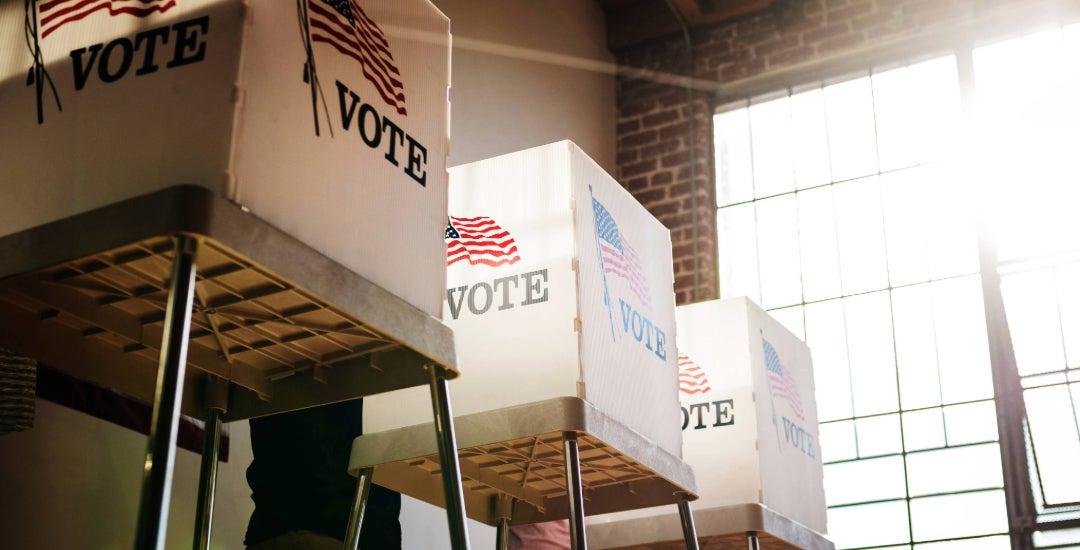This year, 44% of survey respondents identified as independent or other, compared to 38% who identified as Democrat and 18% who identified as Republican. In 2022, the number of people identifying as independent reached an all-time high at 49%. When the question was first asked in 1982, just over 40% of residents said they were independent. In most years’ surveys, the figure is somewhere between 40% and 50%, as Harris County has grown in diversity and size.
The Houston area’s independent identity outpaces the rest of the country, according to Pew Research Center. In a series of analyses in 2017, 37% of registered voters identified as independent, 33% as Democrat and 26% as Republican.
With early voting in the November general election beginning on Oct. 21 in Harris County, the Urban Edge compared the views of Houstonians to national reports that captured opinions on several of this election cycle’s top issues. Election Day is Nov. 5.
More funding for law enforcement
Crime and safety were considered to be the “biggest problem” facing people in the Houston area in the 2023 and 2024 Kinder Houston Area surveys.
Prior to the 2023 mayoral election in Houston, the Kinder Institute published “Election 2023: Overview of Residents’ Policy Preferences.” Houstonians expressed a willingness to spend more on public safety — about 55% approved of an increase to the Houston Police Department’s budget, which respondents hoped would be used to hire additional police officers and civilian safety personnel.
In a 2021 report by Pew, 47% of Americans said spending on police should increase. In a 2022 Gallup poll, participants were asked if they “supported reducing the budget of police departments and shifting the money to social programs.” Support on this issue decreased from 46% in June 2020 to 35% in May 2022.
Major support for women’s reproductive rights
After the Supreme Court overturned Roe v. Wade in 2022, women’s reproductive rights became a high priority for candidates and voters. Abortion will be on the ballot in 10 states this election, but not in Texas.
In last year’s Kinder Houston Area Survey, Houstonians overwhelmingly supported a woman’s right to have access to an abortion. Fifty-nine percent of respondents supported the right to an abortion for any reason. If a woman’s health was at risk, 90% of respondents expressed support, and 80% expressed support if a serious birth defect was detected.
A May 2024 Pew report showed that 67% of Americans believe abortion should be legal in all or most cases, and 36% said it should be illegal in all or most cases. According to Gallup, 54% consider themselves to be pro-choice, compared to 41% who consider themselves to be pro-life.
Embracing immigration
According to a report from the Migration Policy Institute, there are more than 1.7 million immigrants living in the nine-county Houston metro region. In the 2023 Kinder Houston Area Survey, residents expressed positive sentiments about the contributions they make to the economy and American culture.
Seventy-one percent of Houstonians believed that immigrants contributed more to the economy than they took, and about 70% supported the view that immigrants strengthen American culture rather than threaten it. Over 80% supported pathways to citizenship for immigrants living in the country illegally.
In a June 2024 poll, 64% of Gallup respondents said immigration was a good thing for the country. Despite increased opposition since 2016, 70% remained in favor or strongly in favor of “allowing immigrants living in the U.S. illegally the chance to become U.S. citizens if they meet certain requirements over a period of time.”
Corporations, government should lead on climate change
Houstonians recognized the inevitability of natural disasters, often strengthened by human-made climate change, in this year’s Kinder Houston Area Survey. But when it comes to addressing climate change as a whole, about 70% of residents believe the responsibility belongs to federal, local and state governments, alongside large businesses.
The view among U.S. adults offers a similar picture. A majority of Pew respondents said large businesses and corporations, the energy industry, the federal government and state elected officials are doing too little to reduce climate change effects.



